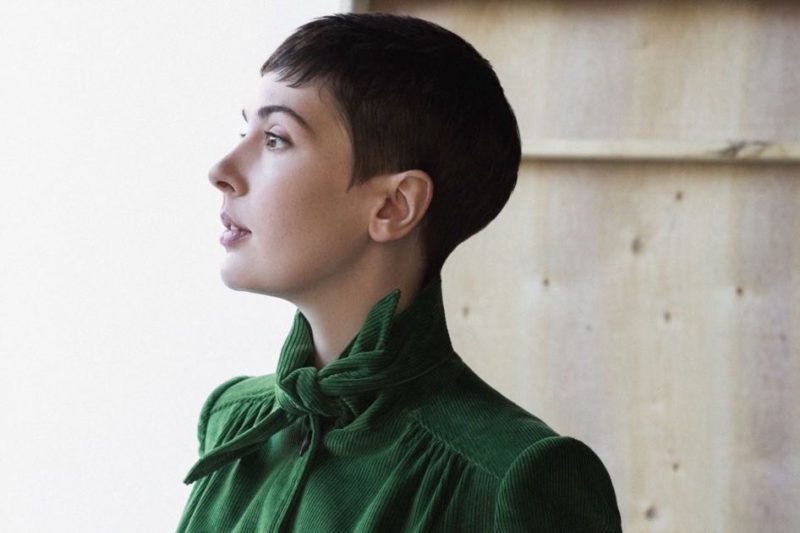
A person stepping onto an altar wearing a cassock is not an unorthodox sight in Catholic Ireland. Except when this person is not a priest, but a writer. Patricia Lockwood, whose celebrated memoir, Priestdaddy, was released last year to widespread acclaim, gave a poetry reading last night before sitting down with Sally Rooney in the Pepper Canister Church.
Humour instantly diffused into the room’s gloomy surrounds, and little wonder: Lockwood is celebrated for her dark humour to the extent that Priestdaddy was selected 15 times as book of the year in 2017.
Fulfilling her self-designated role as the night’s cleric, Lockwood ascended to the church’s pulpit to read some of her poems, including “The Ode on a Grecian Urn” and “Government Spending”. After her reading, Lockwood removed the cassock before joining Rooney on the altar, exclaiming: “That thing is so friggin’ hot.” She added: “I don’t think it improves poetry, it was an experiment.”
Rooney began the discussion by addressing Lockwood’s 2018 lecture, “How Do We Write Now?”, which focuses on the precarious nature of life and writing in the Trump era and offers advice on how to negotiate these uncertainties.
Lockwood, questioned about how her work interacts with the political world, asked the audience if any of them felt “like their mind has been replaced by a phone in the last couple years”. She spoke honestly about the difficulty of reading or writing about the “right” subject while living through chaos.
She said: “On the days that I am perfectly selfish, the first thing I do when I wake up is I make a cup of tea and I read a real paper book. Those are the days that I feel most like myself. I don’t know if it’s even responsible to do that anymore. I haven’t come to any conclusion about that. But the time that I’m the healthiest is the time when I’m most selfish, the time when I’m most ignorant of the outside world.”
“How Do We Write Now?” is an optimistic response to American politics, yet Lockwood confessed that she is not always so hopeful: “That essay represents happiness and that’s not how I feel every day. I feel like a big jangling bag of nerves. I feel like I’ve been poisoned through every pore of my body, like I’ve been running through the Amazon and shot with a thousand little pointed darts.”
Curiously, as a writer, Lockwood said she doesn’t feel that it’s her duty to be political: “I think you can end up being disingenuous if you try to tackle certain subjects or even if you consider a poem to be tackling a subject at all. I think that’s the wrong approach.”
For Lockwood, language takes precedence over subject when she starts to write. She explained that, for her, a poem begins “when language gets knotted up in some way. It’s the language. It wasn’t what was happening that made me write poetry. It’s always some kink in the language that caught my attention, and the poem would come out from my attempt to solve the problem or unknot something, or knot something that seemed too smooth”.
Rooney and Lockwood shifted from the political to the personal when discussing Priestdaddy. Laughing, Lockwood explained that “my father is a married Catholic priest, which is a charismatic backstory that everyone wants to know more about”. Lockwood also uses this brand of humour to address difficult subject matter throughout her memoir and Rooney asked how she happened to develop this distinct style.
“My house has a tone problem”, Lockwood explained. “My dad will come in the door and lift his big dress off his head and he’ll tell us an absolutely atrocious, heinous story about, you know, a tragedy or something.”
She continued: “It is never the case in my family that a certain tone is kept to itself. It all mixes together, so you could be joking one minute and the next minute, it’s like, ‘this bishop did this, or this happened here, or this person threw herself under a train’. There’s an outrageousness or a very heightened sense of the tone my family uses, and I think it’s because when you are dealing with those really life or death things, some black sense of humour goes along with it.”
Lockwood offsets her dark humour with her combative performance style. She often directly addresses the audience, notably in her poem “Rape Joke”, which concludes with the lines: “The rape joke is that the next day he gave you Pet Sounds. No really. Pet Sounds. He said he was sorry and then he gave you Pet Sounds. Come on, that’s a little bit funny.
Admit it.”
Lockwood believes she inherited her performance style from her father, who often spoke in the same defiant manner in church. “My dad gets up at my grandmother’s funeral and he’s like, ‘you’re all here because you’re doing the right thing. You know most people these days just bury their parents in the back yard like pets’.” It seems Lockwood is far more like her Priestdaddy than just a visual imitation of him in his Sunday best.






